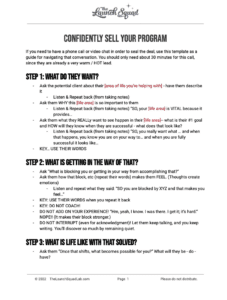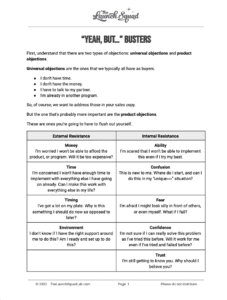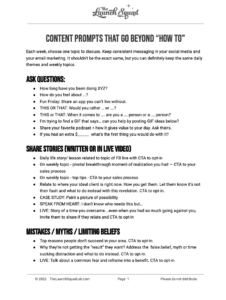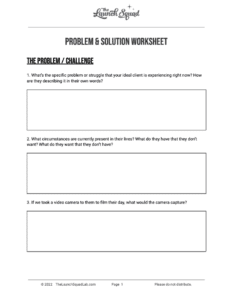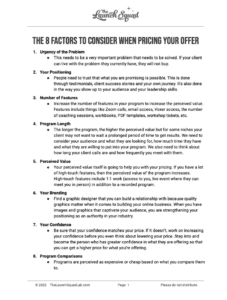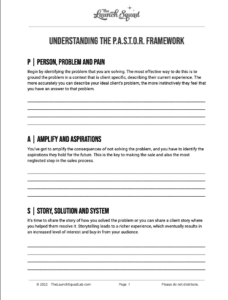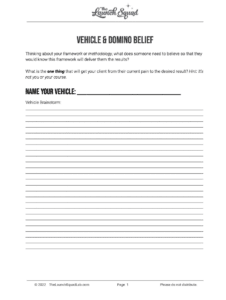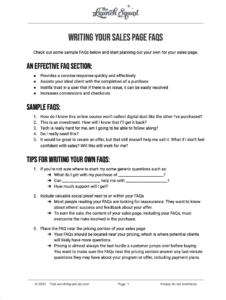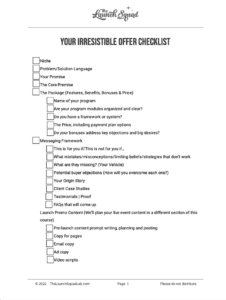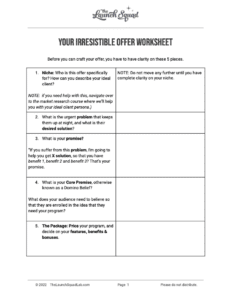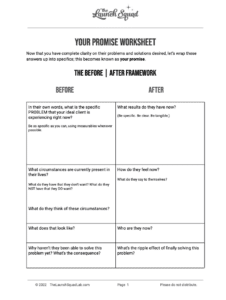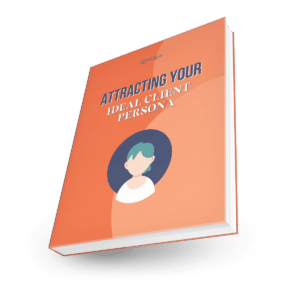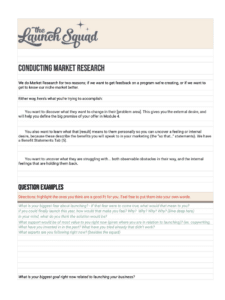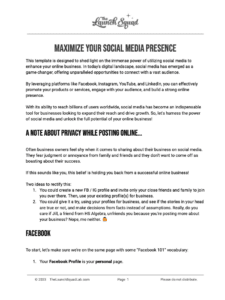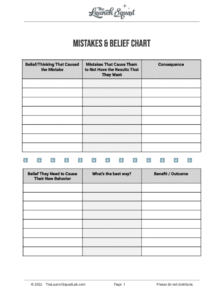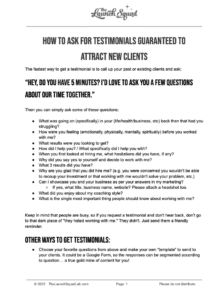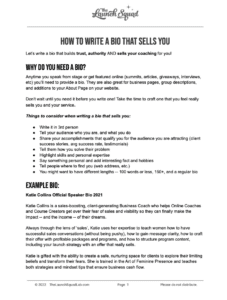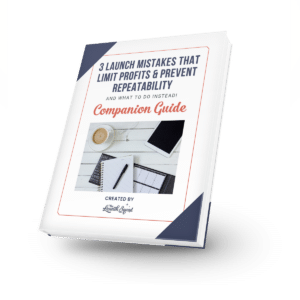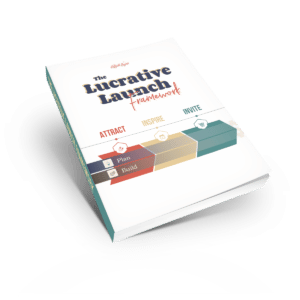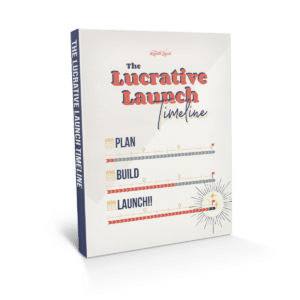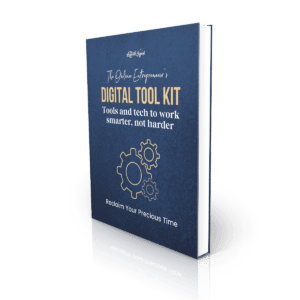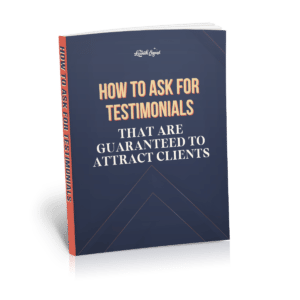Join us in welcoming to the podcast stage, Elizabeth Henson!
Connect with Elizabeth:
[00:00:00] Jeffrey: Welcome to the lightener launch podcast today. We're talking about how to build a strong community and ways to show up as a leader in that community. So stay tuned.
[00:00:57] Jeffrey: Welcome back to the show. I'm Jeffrey summer on I'm back again with Katie Collins. And today we want to dive into ways to leverage Facebook groups, to build a great community and how to position yourself as the authority in that group. Katie, who are we speaking with today?
[00:01:14] Katie: A community and leadership specialist. Our guest today?
built her business on word of mouth referrals, powerful networking, and leveraging her community. She helps business owners who want to become industry leaders, build powerful communities around their brains. So that they become the go-to expert in their field.
Unlike many who focus on social media strategy, she helps build communities using three methods that include growing unique leadership skills, building a social ecosystem and setting boundaries that leverage authority. She's also the host of the messy success podcast, a podcast dedicated to helping creative dreamers and overachievers tackle business and life.
Welcome to the podcast stage Elizabeth Henson.
[00:02:02] Elizabeth: you guys? I'm so excited to be here and to hang out with you guys again.
[00:02:07] Katie: We are so glad to have you here. Um, I know you were a recent guest on our summit and we wanted to continue the conversation because it is, um, you know, Facebook groups, it's been a buzz word for a long time and, uh, we've got, you know, half the population that say they're dead and half the population that say this is still the way to go.
So, um, I know you're not going to say the Facebook groups are dead, but, um, tell us like your thoughts on that. Why do people keep saying that and where are people going wrong?
[00:02:41] Elizabeth: I mean, of course I'm a little bit biased because Facebook groups are what I do. Right. Where if you had an Instagram expert on here, they'd be like, Instagram's the only way. So,
[00:02:49] Katie: Totally.
[00:02:49] Elizabeth: know, I think of course it's going to be whatever you lean into, but Facebook groups are definitely not dead. And I think a great way to start this conversation is even if you don't have a group or have no desire to have a group just by engaging in groups, you're going to get clicks over to your profile.
So I always say like, step one, let's just optimize your personal Facebook profile and make sure that your business is easy to locate because
[00:03:17] Katie: amen.
[00:03:18] Elizabeth: it like so frustrating, right. When you're like, oh my gosh, like, I love that this person commented on this, but what do they do? I can't find anything there.
[00:03:26] Katie: Oh, works at entrepreneur,
[00:03:29] Elizabeth: Yes works at entrepreneur and
[00:03:30] Katie: right? It's my favorite.
[00:03:34] Elizabeth: And Facebook has made it so easy to really create a customer journey, even on your personal page. And I track, you know, the, the downloads to my freebie. And so do my clients. And my number one, traffic is my personal Facebook profile, not even my business one, but that little link on my personal page.
So I always tell people, groups, no groups. I'm not going to convince you either way, but I will say at least optimize that personal profile. So when you're helping people in other groups, they know what you do.
[00:04:04] Jeffrey: amen. Amen. I love that. I think that's, I think that's also something like, uh, that's hard for people to, um, really take on, you know, because they really have this separation of this is my business over here. And then this is my personal life over here. And I, you know, for, from some perspective sure. Like if you really, really, really, really, really want to keep those things separate. One you're missing out on an opportunity, but I guess that's your choice? Like what, what, what would you say? What would you say if somebody really pushed back on that?
[00:04:46] Elizabeth: Yeah, and people do quite a bit. And I always say people are only going to take you as seriously as you take yourself and, you know, unfortunately, and fortunately, however you want to look at it. Um, I feel like I gave up that ability to use social media, like the average human being. Right. But I'm so, um, You know, passionate about the work that I do, that I'm willing to scream it from the rooftops.
I'm willing to maybe share a little bit less about my family and a little bit more about my business. And that's a choice that I made. And I think a lot of business owners make, but you know, you don't see like Simon Sinek or Gary V or Oprah saying like, well, I, I really just, I, I'm not gonna, I'm not gonna scream about my passion from the rooftop because I just want to keep everything separate.
Right? Like you can't really have both, right. You can't try to be Insta famous, but also have your Facebook profile on super locked down.
[00:05:46] Jeffrey: I want to be famous and private. Yeah. Good
[00:05:49] Elizabeth: that doesn't mean that we have to sh you know, it doesn't mean we've lost all privacy and it doesn't mean that you have to have lack of privacy to be successful.
[00:05:58] Jeffrey: Yeah.
[00:05:58] Elizabeth: want to exude confidence in what you do. And when you try to hide that between behind two different containers, it just almost makes it seem like, well, I'm only confident when I'm in this container, but in this container, like I'm not even going to share about what I do cause people don't want to hear about it or whatever.
So I just try to encourage people that, you know, your audience is going to believe you as much as you believe in yourself. So what does that look like to you?
[00:06:26] Jeffrey: Would you recommend, uh, having to private. Facebook profile, like one is like my personal, like a business, you know, business presence, and then change your personal presence into a business presence and then create another account just for your family. Like, what is that legit?
[00:06:45] Elizabeth: Yeah, I mean, I would never, I would never encourage people one way or the other. It just sounds like a lot of work to me.
[00:06:51] Jeffrey: I,
[00:06:52] Katie: Exactly.
[00:06:52] Jeffrey: that, I'm like, gosh, that sounds exhausting.
[00:06:54] Elizabeth: Yeah. Yeah. And you know, in my, in the beginning I shared, you know, so much about my kids. I mean, I did a blog post for like every single month milestone that they had, but things have changed and the internet has changed and, um, they're getting older, you know, and mean, I feel like they're at an age now where I want them to choose and, um, I want to leave a legacy for them.
And I do feel like my business and the positive words that I put out in the world are something that, you know, if I, if I was to leave the planet tomorrow, they would really have this amazing trail of, of my legacy. So I try to look at it that way. Like, even though I'm sacrificing, you know, sharing like my daughters and all the cute beach pictures, like I do share some, but, uh, it's more important for me to really show up for my purpose.
[00:07:43] Jeffrey: Yeah. I love that.
[00:07:45] Katie: Yeah. I think, I feel like social media has changed. I know it has for me, like where I don't post nearly like I used to personally anymore. And I, you know, I, I don't know. I think as business owners, um, I think it's very hard to have two different profiles, so then you avoided even more. Right? So I always like, feel like, like less is more and just make a decision.
If you want to be an online expert, then you have to show up online. That's that's the trouble people are having. Like, it's okay. If you're a business owner, you don't want to use social media for your business. I mean, I think you're missing out in a big way. Um, and if that's your choice, that's your choice.
But to, to be an entrepreneur in the online world and to be doing online launches, you have to play the online game. You can't just show up And do an online launch and otherwise just post pictures of your kids and your dog and your food. Um, because no, one's going to follow you and you're not inspiring people.
Um, so you know, it is this kind of all in I'm
[00:08:47] Elizabeth: we're talking about, you know, Facebook group. So I could also encourage someone like start a group and put your family and your cousins and your uncles and your grandma and your group. And have that be a place that you're sharing about, you know, your daughter's graduation or, you know, whatever it might be.
I mean, I'm acting like I don't share my family. I 100% do, but, you know, I just think there's, there's some people that are less comfortable with that than others, but you can always do a group and make that like your private little, you know, private fan club.
[00:09:15] Jeffrey: Yeah. That's a great idea.
[00:09:18] Katie: Um, all right, so let's um, so you don't believe Facebook groups are dead.
[00:09:25] Elizabeth: no, absolutely not. Absolutely that. And I mean, and honestly on average, like just a well-run group is like 40% active members and that's so much higher than what you would see on Instagram or LinkedIn. You know, I know Tik TOK is getting really popular. Just knowing that no matter what I post, like 40 to 60% of people are going to see it.
Like, to me, that's reason enough, right? Like that's right in line with an excellent, excellent news newsletter rate open
[00:09:54] Jeffrey: yeah, for sure. And I think that's kind of like a, an idea to. You know, put out there as like, we want to, um, engage with our audience as much as possible. So if we're only using email, you're only capturing a certain percentage of it. Right? So there is no matter what, no matter how much you email or how good your emails are or your, your headlines or whatever, you're only going to capture like legitimately a portion of it.
Right. So, I mean, why wouldn't you build in add in other ways of capturing just more and more percentages,
[00:10:35] Elizabeth: Absolutely. And you know, what's funny is, you know, I always encourage people like use your newsletter to send people to your Facebook group. Right? Like remind them of like three cool things that recently happened in the group. And I actually just had a client where we started doing the reverse cause he's got this awesome.
Newsletter like his newsletter is so good, but, and he, he does like link the Facebook group in the bottom, but I'm like, we need to be talking about your newsletter in the Facebook group because your newsletter is so good. So, you know, I think if you already have this newsletter, that's just like super, super, like, he has one of those like big, long ones, but it's so entertaining.
He's got so much helpful information, you know, and then the Facebook group, we're kind of like, what are you working on this week? And I'm like, we need to start pushing people to your newsletter from the group. So it really works both ways. And even in the work that I do, I kind of had this limited, okay.
We use the newsletter to point to the group, but you can totally do it the other way around too. So whichever one, you kind of have, um, you know, a stronger foundation, then you can use that to, to funnel traffic to the other. And it all becomes an experience, right. Rather than a have a newsletter. And I have a Facebook group, they become the same experience.
[00:11:46] Jeffrey: Interesting. I love that. I love that.
[00:11:49] Katie: And I think it's really important for us to be less selfish. Um, it's not about how you always want to receive information, but it's about understanding that you have different types of learners and people prefer things in different ways. And so every time Jeffrey and I do a launch, you know, we're reaching people who are in the Facebook group and we're reaching people who are not in the Facebook groups, because some people don't want to be in it.
Right. And so, you know, for people to say like, Oh,
you know, I just like to send newsletters, you know, to Jeffrey's point earlier, like, well, you're only gonna reach a portion of your audience. And so there are people that hate email, they hate it. They don't want to go in their inbox. Most of our emails are going to people's promo box.
So they're even less likely to even see your email, but they may be, um, obsessed with social media.
[00:12:45] Jeffrey: And vice versa, right. There might be people who just cannot stand Facebook, but they don't
[00:12:51] Katie: they're going to be in their inbox. So it's really important to have that. balanced approach to, you know, the way you reach your people, the way you teach your people And respect that.
Not everyone's just like you. Right.
[00:13:03] Elizabeth: And I just recently, you know, went to a really powerful workshop on, you know, NLP and the vac system. And are we visual or auditory or kinesthetic? So thinking about this being one experience, if you have a podcast and you have a Facebook group slash social media platform, and you have a newsletter, you're hitting all three of those learn types with one community experience.
And it doesn't mean that you're repeating the exact same information on each platform, but you can refer back to it. You can share the nuggets, you can speak it, you know, in different ways, repurpose it, whatever. But it's so important to hit all three of those types of learners.
[00:13:43] Jeffrey: Hmm. I love that. Speaking of which, uh, you coined something called the social ecosystem, like, how would you describe.
[00:13:55] Elizabeth: I would
[00:13:56] Jeffrey: Is that what we're talking about
[00:13:57] Elizabeth: yeah. Yeah. Well that is part of it, but I would describe a social ecosystem as a Facebook community or any type of community that. Interacts and engages without a lot of your time and attention, right? Like it starts to get its own heartbeat because people believe in the work that you're doing.
So they're naturally kind of sharing about it, bragging about it. It's like free marketing word of mouth referrals, but it's really happening while you're asleep because people are just so passionate about the message that you're spreading. So that's what I consider to be a social ecosystem. And you know, when we're, when we haven't gotten any traction and maybe we have a Facebook group of a hundred people, but they're not responding to us yet, they're not engaging.
That means that we need to like feed that social ecosystem so that they are talking to each other so that they're answering, you know, our questions and vice versa. Um, so that's really how I define it. Like it starts to live on its own versus just like us on a stage talking to a bunch of people.
[00:15:00] Jeffrey: I love that. What does that, what does that journey look like? Cause I feel like there's a lot of people who are like, gosh, I feel like I'm just like speaking into the void or, you know, there's not a lot of engagements or whatever it is. Like looking to that idea of a thriving ecosystem in their group.
They're like, oh my God. Yes. How do I get that?
[00:15:25] Elizabeth: I mean, and that's what everybody wants. And sometimes it's truly the hardest thing to get, because it does require casting that vision on a weekly basis. I tell all my, my students, my community, every single week, I want to hear you in some way, shape or form reminding people, you know, this is why you should continue to come here week after week.
This is why, what we're doing as a community is bigger than me. It's bigger than you. Right. And people just forget to remind them, like they get so excited and they opened the doors to a community and they get their first a hundred members. And then, you know, three months later, they're like, nobody's responding to me.
And I'm like, well, you didn't cast your vision and you have to cast it over and over and over. I mean, think about. All the big deal, things that happen in the world, right? Black lives matters. The shootings that the energy dies out. Right? Because that vision unfortunately, is not being reminded on a regular basis.
So whatever it is that you're working towards, you have to be really loud about it. And, you know, you can change it up. You can say it in different ways, but you do have to constantly say it. Um, so that's a really big piece of the, how is that weekly casting of the vision?
[00:16:40] Jeffrey: And is that done just in a post here and there,
[00:16:42] Elizabeth: Yeah, so mine, I usually do, uh, when I'm live. So going live is a great time to re-introduce yourself. So I take that opportunity to just say, Hey, if we have anybody new here, you know, here's what makes this group special. And here's why this group is better than any other group. And I promise if you are running out of things to say in your group, you can just come here and copy and paste.
[00:17:04] Jeffrey: Hmm. Yeah.
[00:17:06] Elizabeth: questions or share. I mean, I've had members, you know, share a poll that didn't work. And I was able to look at that poll and tell them exactly why it didn't work. And then they went back and changed it and then they shared their results, like stuff like that is so cool.
[00:17:21] Jeffrey: Oh, that is so cool. I love that. That's what, the stuff that really lights me up is like, when somebody is like, uh, you know, ha stumped, they've got questions and, you know, support. And can I to witness that breakthrough or that achievement? It's a tiny, tiny little achievement, right. But you're like, yes, score.
You did it.
[00:17:45] Elizabeth: Yeah. Yeah. I mean, those are the powerful moments. Cause that's what every Facebook group leader wants. They want their people to ask questions, but in order for them to feel safe, We have to be very open and very vulnerable and kind of admit that we don't have all the answers because people can feel very intimidated if we're just going to be giving them answers all the time.
Right. But we're just, we're just showing them possibility. And I love to just, you know, ask them to share what's happening in their groups. Like one of my favorite threads is to just say like, what'd you post in your group today? And then they'll share, you know, their conversation starters and we'll kind of compare how they worked or what worked and what didn't.
Um, but really just giving them that opportunity to talk about themselves. Like it's not, it's not about me and it's not about what I want, but it's about like listening to what's going on in their groups and giving them an opportunity to talk. That's what all human beings want. Like we're very selfish creatures.
[00:18:38] Katie: Um, Yeah. I remember hearing from a coach one time, like, make your questions pretty easy to answer, you know, if we're always like, what's your biggest challenge? Like a lot of times they don't really know what their challenge is or they don't want to lose face by admitting there a challenge. They're even more likely to be like, none, I have no challenges.
Right? Like they think that makes them look good or whatever. Um, you know, but being like what's for dinner tonight, or, you know, this or that kind of posts, not all the time, but to keep the engagement coming, give them things that are easy to answer where they don't have to lose face. Right. So,
[00:19:20] Elizabeth: with an extra two hours a day? Right. So rather than like, you know, are you really struggling with time management? Like show them possibility? What would you do with an extra two hours a day? You know, or like people love to answer like, Hey, 30 K dropped in your bank today, what are you buying?
Like, people love that stuff. Right.
[00:19:36] Katie: Yeah.
[00:19:38] Elizabeth: And it's easy to answer and it gets them like kinda, you know, talking in a selfish way, but also a very healthy, you know, way to, to have energy in the room where they want to participate with.
[00:19:50] Katie: Yeah. So let's back it up and talk to the folks who are considering opening, opening a group, but they're scared of like the time commitment or that it's just not working or they're going to talk to themselves and we're going to go into all these things, but let's just start at the very beginning.
Um, like what are things that somebody should consider, um, and sort of answer before they even start their group.
[00:20:14] Elizabeth: Yeah. I mean, it's, I always like to get on the defense and be like, it doesn't take time, right? Like 80% of your content is one line or less, but people aren't gonna believe that really until they see it. So I would ask questions like, you know, if you could get 20 new leads or 20 email addresses a month without Facebook ads, like how much of your time is that worth to you?
Um, You know, and they may say, oh, like, I, that's not worth my time because I can put money in a Facebook ad machine. Right. Like, those are just really important questions to evaluate. But, you know, I would say on average, uh, most of my groups are growing at a rate, you know, of 20, 20 members a month, five members a week.
And that's with like minimal effort from the visionary. Because a lot of times I like to say, like, I'm the emcee, I'm just going to keep the crowd entertained so that you can take the stage. So it's really minimal, minimal effort, but if they lean in and you know, like most, uh, if we do a summit or you're on a podcast, like there's usually like kind of pops of much larger groups of people coming into the group then, but you know, the effort it's, it's kind of like how much, what do you need to see from your effort for it to be worth it?
And let's set goals based on that. And then let's figure out how to make the. Fit the desired results, because anything that we do in this life, you're going to get back what you put in. So if you're only willing to put in five days, five minutes, a day or five minutes a week, then let's build the Facebook plan around that.
[00:21:53] Katie: Hmm,
[00:21:54] Elizabeth: I'm to tell y'all right now, I spend way more time on my Instagram content and I get way less results.
[00:22:01] Katie: Oh my God. I was like, checking out your, your Instagram out before this podcast. And I said to Jeffrey, I'm like, oh my God, her IgE is like, so curated.
[00:22:10] Elizabeth: I have help.
[00:22:11] Katie: just looks so good.
[00:22:13] Elizabeth: help. I definitely have helped, but isn't that crazy? Like I put in, oh my gosh. Like, because you know, my, my help, my social media person kind of does it. She does all the aesthetics. Like she puts together all the final pieces, but like, we still have to meet every single week to get that content in there.
The visuals, like I'm paying somebody to help me where our Facebook group, you don't need the branded content. You just need to ask a question. Like the amount of effort is incredibly skewed. Um, and honestly, if I was still a solo preneur, like I would just drop Instagram and just hang out in Facebook groups, knowing what I know now.
[00:22:50] Katie: It's pretty much why we don't really put a lot of effort in, into Instagram. I I've always just enjoyed Facebook better and maybe that's my age or whatever, but I'm just like, I'm not here. I don't, I don't care about curated memes. I just don't care. you know, I'd rather just be in a community and.
[00:23:08] Elizabeth: know, crossing over from a visual, um, industry. So I was a wedding photographer and like, all my inquiries came from Instagram, but it's an extremely visual, right? Like my sister-in-law's a baker and she kills it on Instagram because she's just showing her beautiful cakes.
But you, you guys are coaches and service providers, and now I'm like pivoted into being a service provider. And it's, it's an uphill battle to use Instagram as a service provider. Cause you just don't have that eye candy. Right. We can make amazing graphics and be really informative, but it's still not like that eye candy.
So they're very
[00:23:46] Jeffrey: that is such a huge
[00:23:47] Elizabeth: Yeah, but in Facebook groups, even if you're not using your own, you're helping people, you're showing them possibility. You're asking, you know, coaching, helpful questions. So another reason, you know, if someone's trying to choose, where do I spend my time, like, be really intentional about the industry that you're in.
[00:24:08] Jeffrey: I love that. I think that's so valuable to just, to, to hear it. You know, if you've got products and visual things to share, like IgG is a great platform. If you're a service provider, then it's suddenly more different. Right now you're trying to really kind of conjure up and think of graphical elements to display this idea of coaching and supporting people where that kind of happens naturally in a Facebook group, right?
[00:24:43] Elizabeth: Absolutely. I mean, people go to Facebook groups to talk people don't go to Instagram to
[00:24:46] Jeffrey: Yeah, yeah,
[00:24:48] Katie: I, and I think Instagram is really a place to like get new followers, but then bring them somewhere. Right. So, you know, cause like I follow a couple of people or you know, some of my mentors, you know, they're good with reels. Like they're funny. And every time I see Luke, this one guy, he's just a sense of humor is just in front of everything he does, you know, and they're hysterical and I'm like, that's so great for him.
It really works for him. It just doesn't work for me. I don't, I don't care. Those reels, like at all, I've even, I've tried to care, like I've taken trainings and learned how to do it, you know? And I remember getting excited about it for like a day. And then I was like, I just don't want to stop doing what I need to be doing for my business.
Like I just don't want to get so caught up in the fluff of trying to quote unquote, get new followers that I lose track of time in trying to do things that matter to me more, um, like create content, you know, um, from my, from my current clients things. So, you know, I think the most important thing is just knowing the strategy you're choosing and for what reason.
Right. And it has to kind of go with your personality. And some people think, you know, Facebook groups sounds way harder than making reels and you know, that's all right. But,
[00:26:03] Elizabeth: And I would tell them they're
[00:26:04] Katie: but we don't understand them. Yeah.
[00:26:06] Elizabeth: yeah. Oh my gosh. I had to, yeah. If I didn't have help, there would, there would not be reels on my page. First of all, when I started doing them, myself, my friend, Sharon, who does my Instagram, she was like, you are no longer allowed to post those. I will be doing this for you. like, anytime I go rogue, she calls me out and she's like,
[00:26:26] Jeffrey: Nope.
[00:26:26] Katie: Yeah.
[00:26:27] Jeffrey: Stay in your lane.
[00:26:28] Elizabeth: yeah, exactly.
[00:26:31] Katie: um, like I want to know, Um, one of the most common questions we get is, you know, our clients are going to open up a Facebook group, perhaps because they're launching and they want to know what they should name it. So what are your kind of go-to, you know, rules or whatever around naming it.
Like, I know one should be like that. It should be named with a word that somebody would actually search
[00:26:55] Elizabeth: Yeah, so a lot of people don't realize that Facebook groups are searchable and there's an SEO opportunity. So, you know, old me would have been like Elizabeth. Great community group, right. Or Elizabeth Elizabeth Henson group. But like, nobody's searching my name. They're searching like how to build community, how to get more engagement, you know, Facebook group management.
So knowing what your people would be searching for that launch is very, very helpful. You can put it in the title, you can put it in the description. You can also put who the group is for. So like for service providers, for course, creators for dog lovers, you know, whatever it might be. Um, so there's an opportunity.
I try to put both in there some way shape or form, and you have decent amount of characters in a Facebook group name, and you can change it. I think at least once a month, they allow you to change it. So change it for the launch and then, you know, change it for year round. If you're staying open or whatever, then.
[00:27:52] Jeffrey: Yeah. I liked that, that, that kind of really gives you a peace of mind to say, okay, I can jump in, start posting, start building a community. And if I have to, you know what, I'll change it
[00:28:05] Elizabeth: Yeah, exactly. Like we're never married to it, so you can always try different things. It's all, it's all data. It's all little breadcrumbs trying to figure out what works and what doesn't. Um, and then the, just the description. I love, love, love to see groups that say like, this is for you. If, and this is not for you.
If, so you've got that first sentence. That's going to show up in search then maybe a brief introduction about yourself. Then this is for you. This is not for you. And then an opportunity to download your freebie or whatever you're promoting.
[00:28:33] Jeffrey: I love that.
[00:28:34] Elizabeth: Yeah. Super
[00:28:34] Jeffrey: think we probably need to update ours.
[00:28:39] Katie: I think I just saw somewhere that Facebook actually does now save, um, the information from the questions that we answer to enter groups.
[00:28:48] Elizabeth: Yes.
[00:28:49] Katie: That's a new thing that that's like, that's it? Yeah.
[00:28:53] Elizabeth: Yeah, because, I mean, so I use, um, a program called group leads. I might've told you that last time we talked that, um, captures all the answers to the membership questions. Right. And, um, I don't even use it to capture the email. I have them kind of do that on their own. Um, but I still want to learn about my members.
And I love that over time because I'm documenting the answer to those questions. I almost have this like service directory of what everybody in my group does. So if I really wanted to like refer out a graphic designer or a coach or whatever it might be, I can always go into that sheet and kind of search and figure out who does, and then I can tag them and like really have some of that, like shine the light energy inside the community.
So even if you're not collecting email addresses, which I totally think everybody should, um, then you can at least learn about your community and what they might be struggling with or whatever they're willing to tell.
[00:29:47] Jeffrey: Okay. I know people are taught there. They're asking this question right now, wherever they are listening to this, they say, how do you collect people's email addresses when they're in.
[00:29:55] Elizabeth: Yeah. So, um, there's two ways. So what I have done, um, which Katie S I think you said you just kind of walked through the process, is I just say, have you already downloaded my free guide? My conversation starters, and it's a yes or no, but it has the Bitly link. Um, or it's like, yes, no, on my way. And there's a link.
They do have to copy and paste it, but I did it this way because that's a little extra effort on their part, so they care a little bit. Yeah. Because they're actually taking the time to copy paste that my freebie is everywhere. It's not hard to find, but I do want people to raise their hand and like make that little extra effort because that means they're more likely to open it.
Um, but what most of my clients do is they just say, Hey, do you want, you know, 10 ways to tie your shoe, leave your email here. And then we sync up the answer to that question into a Google doc, which then goes right into their newsletter system and their welcome sequence. Um, I did it manually for a while until I discovered group leads.
And now I will never go back to doing it manual.
[00:30:56] Katie: I just think back to when I first opened a group, it was probably 2018 maybe. And I used to screenshot the answers to their questions. Um, just as proof to my email marketing system that they did in fact, cause I imported, you know, I did it. manually for a long time. Yeah. Um, I, you know, I Like
um, We have it set so that they enter their email.
And then we, we do still do it manually because w where I want to talk about this too, like group numbers, because like I had another group and I abandoned it. Um, and just whatever, I just abandoned it for a lot of reasons. Um, archived it but I, I effectively said bye-bye and then I
[00:31:44] Jeffrey: it means, sounds like you've just left them all hanging and you're like, oh, I'm not going to talk to them
[00:31:48] Katie: No. I was like, come on over to this group. Um, but I, I see group leaders who get these huge numbers. Um, I've seen two people do it recently where they've, they they've reached seven or 8,000 members. and like now one person archived that group and now you have to pay $19 a month to be a part of her new Facebook group, And like another person just was like, oh, you know, we just reached 7,000 members and I didn't watch her live, but You know, come and watch me live. And here are the changes, you know, um, we are never the kind of company that's looking for numbers We're looking for people that want to engage and we do better. actually with smaller groups of people than the masses.
That's never really been our, our thing. And so manually doing, you know, we have a team member that manually enters their email into our. Actually into a spreadsheet, Jeffrey of course set up Zapier so that everything happens
[00:32:46] Elizabeth: happens. Yes.
[00:32:47] Katie: with, with the lick of a zap.
[00:32:49] Elizabeth: Yeah. Yeah.
[00:32:50] Katie: Um, you know, but anyway, so yeah, I'm curious what you, what you think about, you know, how big does a group need to get before somebody can expect to get some pain clients out of it and how big is too big or how do you manage it and keep community going when it does get really
[00:33:09] Elizabeth: yeah, those are good questions and very, very common questions. And, you know, I think whatever's working outside the group, as far as your marketing machines, the way you sell your product is going to work inside the group. Right? So there, I don't want there to be a misconception that like, if you're not selling anything anywhere in the world and you open a Facebook group, and then all of a sudden you're going to be making sales, right.
It's all you have to have the right messaging and the right, you know, marketing and whatever that, that is B B on your journey of experimentation to figuring it out. Um, but I don't care about the numbers either. And, you know, I like to look at how many of those members are active. And I like to keep my Facebook groups really clean.
Like I keep my newsletter clean, right? Like if someone is not opened an email, you know, and three years, they're not going to all of a sudden like, oh no, you know, now I'm interested and they might, right. But there's ways to keep your group clean the same way that you keep your email clean, which keeps that engagement higher, which shows it to more people.
And, um, as far as the really big groups, I think, especially if they're engaged, like you can have a huge group and have crappy engagement, but you know, if you're that big time, then I really encourage people to have a team and to share the. the business. So I don't really, I'm not really a fan of like the ghost writing.
So align that I draw with my clients is like, I'm not going to log in as you and pretend to be you. Like I am, I am your emcee. I am like another face of your business. That's here to be your advocate, right? I'm not going to hide behind you and ghost write, like, that's not fun for me cause I'm just an extrovert and an outward facing.
But when your group grows that big, it's physically impossible to maintain that boutique customer service. So in order to maintain a boutique customer service, you have to have help and other people that your members will fall in love with. And if you can't do that, then we need to go back and work on some leadership skills, because I have seen groups that master the big numbers and it's because they have, you know, uh, number two, number three, number four, people that their community members are just as excited about, right?
Like James Wedmore's group. It's like, yes, Jilly's here today. Jazzy is here today. Like we knew them all by name. They're all incredibly awesome. So, you know, when you've reached that level where it feels difficult to still be positive and distill, curate that experience in the room, then, you know, bring in some help, bring in some other faces, some other coaches or moderators, whatever it might be. Did that answer the question?
[00:35:41] Jeffrey: Yeah. Do you want to be our spokesperson in our group
[00:35:44] Elizabeth: Yeah, absolutely. I'm so down. I know. And I'm in the process of, you know, cause I I'm in a couple of groups and it's not exhausting for me because this is what I do. Right. But I am, you know, I'm in the process of building an agency and I have we're about five, but I'm still working on like getting the other person that can be me.
That's like the
hardest
[00:36:07] Jeffrey: will say. And I'll say as an introvert, as probably the only introvert on this call, it is difficult being that presence and being that outward facing voice is just excruciating for me.
[00:36:29] Elizabeth: See, I'm going to screw. She had don't put me in a box or I'm excruciating.
[00:36:32] Jeffrey: Put me in a box that's comfy. That is
[00:36:34] Elizabeth: I love it. I love
[00:36:35] Jeffrey: sit in that box. No
[00:36:37] Katie: It's fun. I'm like somewhere in the middle, but I, cause I've just been with COVID for the last two weeks. um, and the week before that I had something go. So I've just like have missed my lives that I do on a weekly basis now for three weeks in a row. And I'm like, oh God, I hate, you know, like I hate like letting people down or falling short on my commitments, you know?
And then these are the part of me. That's like, Katie, if you're sick, you're sick, right, Virtual or not. Nobody wants you showing up with COVID.
[00:37:06] Elizabeth: right, exactly. You say don't I don't want to get it through the computer screen.
[00:37:12] Katie: You know, because I think that part of being a leader is admitting like I'm sick and I'm not going to stick with a commit, make a commitment more important than my own health and wellbeing. Right. Like, I, I don't stand for that. I think that's like a little bit too much in the hustle column and having, Hey, if you need to rest, you need to rest.
I mean, I could work for like an hour a day and that was the extent of it. So,
[00:37:34] Elizabeth: Gosh. And now it's hard. We had it in January and I was done.
[00:37:39] Jeffrey: I'm just a big baby. I just, I'm kind of a little sniffle I'm out for the
[00:37:42] Elizabeth: Oh man, flu man. Flu is a thing.
[00:37:45] Jeffrey: man flu.
[00:37:46] Katie: It is, a thing.
[00:37:47] Elizabeth: it is 100% a thing. for some reason my husband always gets it like 24 hours after I'm sick. So I'm like, I'm sick. And then I'm like, I can't even take my sick day because now my husband has man flu. Like he will, my temperature is like 99. His is 1 0 2, like
[00:38:04] Jeffrey: Yeah.
[00:38:04] Elizabeth: always stealing my sick days.
[00:38:08] Jeffrey: Oh, you thought you were getting a day off, huh?
[00:38:10] Katie: Oh
[00:38:11] Elizabeth: my gosh. So funny.
[00:38:13] Katie: um, but I, I loved this, um, you know, I downloaded your free gift on, um, different, you know, engagement prompts or whatever, and something in there you had quoted somebody saying, you know, when we spent more time creating than we do engaging, we lose sight of what matters. Right. And, um, I think that, um, some things that I had to overcome, I'll just share my own personal experience.
Like Facebook lives don't have to be an hour. They don't have to be, you know, this like the three mistakes to this, the five keys to that. I mean, sure. If you could do like one of those, sometimes I'm not even gonna quantify it because it's up to you in your own content, whatever, but you can drop a really good podcast or a Facebook live that's five minutes. You can help change someone's mind or, you know, help them through something in the five to seven minute training. So, um, that's something that I had to learn and then I loved learning from you that, you know, we didn't need to curate, um, branded elements to put in the group. And in fact, People kind of skip over those more so than if you just chose a background and asked a question,
[00:39:26] Elizabeth: People would be like, gosh, why is nobody responding to me? And I kind of look in their group and it's like, they're trying to replicate Instagram on Facebook groups. And it's just not the same. Right. And you need enough branded content. So that there's a brand awareness, like your color choices, like your face needs to be in there, you know, a graphic every now and then with like your fun fonts and colors.
But now 80% of the content is just use what Facebook gives you. Try not to post links. So if you're growing a group that you really want to capitalize on the SEO and you want the group to show up in the sidebar and be served to people in that way, then you really have to play Facebook Facebook's game and stay away from links because they really, they know when you're taking people off of the platform.
And, you know, a lot of the people that have had their group, you know, go viral it's because they're not allowing any links whatsoever.
[00:40:18] Jeffrey: interesting.
[00:40:20] Elizabeth: And like, honestly, if people are following you enough to know about your podcast, they don't need the link. They know what they know where to go to get it. Right.
[00:40:27] Jeffrey: Yeah, yeah,
[00:40:28] Katie: right. Um, oh my, I just lost my train of thought. I have COVID brain, um,
[00:40:36] Elizabeth: it's hard though. Like we are
[00:40:37] Katie: such a brain fog,
[00:40:39] Elizabeth: for that CTA, but I think in groups, what I'm seeing across the board that works better for a lot of reasons is like, you know, Hey, I just did a podcast episode or a free training. I just did a free training on how to tie your shoe, who wants access.
You know, and then they start saying yes, below, and then you message them the link and this, and then you go back to the thread and you say, Hey, I just messaged you the link. This does a couple of things. It keeps links out of the group. It gets them checking their messages from you. So now you're white listed on their messages or whatever it might be.
And it keeps that post at the top because people are engaging on it. You're engaging on it. And you want to be mindful because it could feel a little salesy if you do it a lot, but it just is, you're engaging with them. One-to-one right in the messaging thread. And you're commenting back on them instead of just like, here's the link go shop.
So it's a little bit more personal. Um, then if we just say like, go sign up, here's the link, go watch my YouTube.
[00:41:39] Katie: Yeah. Yeah.
[00:41:40] Jeffrey: I, you know, I think this is huge. I think this is huge. These kinds of things are like the subtle gold, right. Because I mean, the first thing I would think of is like, if I were to say that I would just pop the link in the chat or pop the link in the description or put exactly. Exactly. But what you're saying is that there's just with a slight shift in behavior, you can really start gaming the algorithm.
[00:42:09] Elizabeth: Oh, you can game the algorithm and you know, people are gonna feel more seen. They're gonna feel more heard because you're not necessarily defaulting to what's easiest to you. And when people raise their hand and they say, yes, I would like the link. Same thing I said before. They're more likely to take action than if it's just sitting there.
They're going to say, okay, I can go back to this in an hour. Cause it'll still be sitting there and I never go back. But if you personally message it to them, they're going to feel that connection and that obligation to like, go check it out and maybe say, thank you. Or I loved it. Or give you feedback.
[00:42:45] Jeffrey: I love that.
[00:42:46] Katie: Yeah. Yeah.
[00:42:48] Jeffrey: I think that's so profound. I think, I think
[00:42:50] Elizabeth: And you'll start, start paying attention. Yeah. I started paying attention and some of the groups, um, that do that. And even, not even in groups, even, uh, you know, our mutual friend, Joey has done this on his personal page. It's so it's so great. Just like, Hey, I've got this, you know, blah, blah, blah. Like who would like a copy?
And then people just say, yes, he just did it to promote his group the other day. I've got this awesome group. Let me know if you want to join. We'll personally invite you. Um, I don't ever use the invite button to invite my friends. I always send them a personal message or email. Um, you know, just a lot of the, a lot of these little behavior, things that are more, you know, how, how do you want your attention grabbed for a, on the other end?
Right. Do you just want that pesky invite thing going up, or do you want that personal email from your friend where you can really properly cast the vision?
[00:43:40] Jeffrey: Yeah, chances are, I wouldn't see that, you know, somebody just clicked invite or something and I probably wouldn't see that invitation, but if somebody messaged me, I is much more likely than I would see
[00:43:51] Elizabeth: oh yeah, absolutely. And I'm the worst I'm going to like explode expose one of my limited beliefs here. One of my, you know, when it's something I can work on here, but sometimes when I get those like pesky invites, especially if it's over and over, I'm like, man, what have you done for me lately? Right? Like, I've got 10 groups.
You're not in a single one of my groups. Why do I want to come by, you know, your LuLaRoe or whatever. And I know that's terrible. Like my leadership mind is like, don't behave like that, Lizzie, you know, be the example, but it's, you know, it's kind of true. And that, that thought process of mine is what the most of the population kind of defaults to.
So how can we be that person that when we finally do make that ask, like people know that we have already acknowledged them, right? Like it would be totally appropriate for somebody in my community, on my newsletter list, you know, that I consider like in my network, in my circle to send me a message and be like, Hey, I'd love for you to come support this new group that I've got totally appropriate.
And I would be like, heck yes, I'm there.
[00:44:52] Jeffrey: Yeah. And I think what you're talking about here is addressing the limitations of human default
[00:44:58] Elizabeth: Yes. Yeah,
[00:44:59] Jeffrey: That's huge. That is huge. If somebody walks away with anything from this episode that you're addressing human default behavior,
[00:45:10] Elizabeth: And, you know, and for whatever reason, I've always had a superpower and just making people feel safe and included. And you know, it's the extrovert. I don't know hospitality. Who knows why I am the way I am. Right? Like we all, we all have our little gifts, but you know, I've just always been told. You're so great at recognizing people and bringing people together.
So this is me trying to figure out how to make a career out of that.
[00:45:33] Jeffrey: Yeah.
[00:45:35] Katie: I, but I love it. I mean, it's, it's a little bit of going the extra mile. Um, cause when you treat people differently than the way everyone else is doing it on Facebook, you know, and I I'm very direct and I like to save time. And so I used to be that person that would be like, oh, Hey, I'm doing a launch and this is all the information.
And here's the link, you know? And it was just like a, too much. And B I'm like shoving a link in their face and they didn't even say they wanted it. So I really had to learn how to write, you know, even like a personal note. I mean, I would do a template, but then I would add a sentence in the beginning every single time, which is why it was hard for me to get a VA to do this because I knew them personally, but I would reach out And say, Hey, I remember when you and I chatted about this.
And that's what made me think you might be interested in. Right. And then insert template. Um,
[00:46:25] Jeffrey: And it, my, my brain is also doing this thing where it's like, I hear you describe that process. That's, that's, uh, addressing human default behavior and I'm thinking all those, that's not efficient. That's not efficient. And my brain is like, ah, what would be efficient would be to put the link in there and, you know, just have it all, like what Katie was saying.
Like, here's all the information you need. Here's the link you need, you know, that's, that's all you need. That's efficient. I just posted once
[00:46:52] Katie: but efficiency doesn't land.
[00:46:55] Elizabeth: it's, but it's, and it's so much more efficient than you think. So just to kind of give you an idea of numbers. So one of the groups that I was in that really mastered this as a group of 2000, he does probably one of these type of posts every single week. And a lot of times the old ones get traction.
And so they're always, they're just always going. Right. And, um, so I was helping send those messages at one point, but we were booking 30 sales calls a week. So 2000 group, you know, 2000 member group, and then these posts would get. Sometimes 50, sometimes a hundred. I saw as many as 400 comments, but it's because they live on, right.
So they like, even if it's six months old, someone might see it and it's going to get bumped to the top. And, you know, he had like 10 different things like freebies that he would rotate that all look like led you to book a sales call, but 30 sales calls a week, you know, and it's it's efficiency because he trained his team to do all of this.
So it's not, it, it's not really him. Right. So there are ways to take, you know, these human behavior experiences, getting people to raise their hand, that can be efficient. And Katie, I love what you said earlier about like you archive the group because when I started my group, I had the same thought process, right.
I'm like, oh, I've already got this like big group of people that love me. But, so what if it was like an old project? And I really had to like, do some soul searching about, do I want to start a group from scratch or do I want to just rebrand it and kind of already have some people in there for vanity reasons.
Right. So I decided to start from scratch and it was the best thing I could have done because everybody in that group is in that group because they downloaded my freebie or because they like want to genuinely learn about community building and Facebook groups. And I just noticed like right away, I showed up differently because I wasn't trying to curate for my old friends or my old supporters that I was just talking about this one specific problem.
And I can talk about it over and over and over because that's why they're there. So it was like SU I was, I don't care how many, you know, how few people are in this group because they've all raised their hand. And even if that's 30, 30 people in a room raising their hand that want to hear from you, like that's a lot of people.
[00:49:15] Katie: Yeah,
[00:49:15] Jeffrey: that's awesome.
[00:49:17] Katie: I had to part ways with my group because the original group was built on a vision of promoting each other, helping each other, you know, when all boats rise with the tide type of thing, but it wasn't happening. It was a hundred percent self serving promo by like five people. And then there were like 500 other people that were just getting spammed by the same five people week after week after week after week.
And I was like, I'm cringing. This is my group. And I am cringing. And I just knew that, group, it was built on promotion. It was built on the idea of promotion. And so there is no way I could turn that into an anti promoted, you know, a non-promotional group. Uh, you know, I, I just was like, I just have to abandon it, like my leadership.
I didn't know how to lead. I mean, I, I try, I try, I tried to talk about collaboration and how it was really great when other people were promoing you could see what they did, but then, you know, reach out and collaborate. And, um, anyway, so in, and then I just found for, for Jeffrey and I, when we came together as a business, you know, we each had our own business.
And for me it felt like I was straddling two businesses to try to be in my group, showing up and doing one thing. And then we're just at this other group and trying to show up and do that and the podcast, and like, I just felt so pulled. I was like, let's just do this one new group better.
[00:50:45] Elizabeth: Yeah. And that,
[00:50:45] Katie: And, you know, no one's allowed to promote in there.
And you know, it's like, it's specifically about launching and, you know,
[00:50:53] Elizabeth: Yup. I love it. And even if it's, you know, you're starting from ground zero, at least you have everyone in there that wants to hear what you have to say about a specific topic. So I'm all for
[00:51:02] Katie: right. Yep. Yep. So, um, let's talk about prompts a little bit. I know we're going to wrap this up eventually, but, um, you know, I think the, the number one question is, what do I name my group? The number two question is how do I get people to actually respond to? It feels like crickets. So twofold one. I remember having my first online mentor tell me, get used to talking to yourself for about 90 days.
And that. really helped me because 14 days in I'm like, oh, she said 90, right? Like it's like, it is hard to go live and nobody's commenting and no one's showing up. And I think that's just as the group is building, but what are some tips you have for our listeners, um, for engagement prompts or ways to really encourage that engagement and almost demand it.
Like we have another mentor that says demand rapport, right? Like how do you, how do you do
[00:51:57] Elizabeth: So I think, you know, going back to like 80% of content can be one-liner less than how we talked about. People want something that's really quick and easy to answer. Right. Really quick, easy to answer bonus points. If they get to talk about themselves or show their expertise, like right now, one of the hot conversation starters is like, what could you give a presentation on?
And only 15 minutes, right? Like that one's hot all over the groups because people just love saying what they're an expert on. Um, but it's quick and it's easy to digest. It stands out, you know, as they're scrolling, um, really just learning to pivot your questions so that people want to answer and they can answer very quickly.
Um, and then I, I agree with the 90 days, I would probably spin it. To a hundred members versus the 90 days, um, you know, your group will, you know, really just be patient and stay focused on driving traffic to the group until you hit that first hundred members. And, um, then really focus on serving those 100 members really well.
Uh, because it's really easy to get up, to give up, right? Like, oh man, like I've only got 30 members and nobody's talking to me, but yeah, you have to continue to talk, you know, when you feel like nobody's listening. And I do talk to my members about this all the time, because that's part of being a good leader is. Believing in your mission. So fiercely that you will talk to nobody, right? Like I believe in this so much that I will go live for no one for as long as it takes, because I'm that determined. And that what gets is what gets people believing in you, right? Not because you nailed it on the first try, but because you were so determined, You know, to get it right.
People love drama. They love watching the messy journey. They don't really get that excited if we show up perfect the right time. Right. Like, you know, so many photographers would try to show up like, okay, um, I'm taking pictures and I'm practicing and they haven't shared a single one. And then when they finally feel like they got that one great picture, they post it.
And then they're so disappointed because nobody engaged. Right. Where, when I first picked up my camera, I was like, oh my God, I got a blurry background. Look at this. Oh my gosh. Look at this lens that look, I'm showing these horrible images, but this is how I built community. And, you know, got my photography business to six figures in three years because I was willing to show the messy.
All of it. So people were cheering me on, cause I got my first wedding. People were cheering me on like when I got my business license and every single step I was sharing incredibly vulnerably. And that's, that's how you get people involved because they're cheering you on and they believe in your mission.
Not because you like hid in a closet and got it just right. Hence the messy success. Right.
[00:54:49] Jeffrey: Right.
[00:54:50] Katie: I, I think that's a part, um, of, you know, leadership, um, number one, like removing your ego out, right? Get, get rid of the vanity metrics, get those out of your head, you know, show up and serve. And you know, what, if five people watch your Facebook live and one books, a call, you just booked a sales call
[00:55:11] Elizabeth: absolutely.
[00:55:11] Katie: because you went live on Facebook, right?
Like you don't need huge numbers. Um, but you need to have your passion and your leadership and be willing to crown yourself as that expert. So I think it's the people that are still kind of unclear on their niche or trying to serve too many people. Their message is vague or watered down. Right. So there's so many pieces to the leadership. In building your business that really matter. Um, you know, every time someone comes to us with like their, you know, niche, or what do you do? Statement type thing. And anytime they use the word people we're like, cross that word off, please stop saying people, you have to narrow it down away from people. Um, right.
So I think the leadership skills, um, you know, the confidence and the commitment and removing the ego out of it, um, and letting you know the people who appreciate you show up and, Um, you know, if have you ever had a hater in one of your groups or a. comment, or that was kind of mean, um,
[00:56:14] Elizabeth: it. This is, this is something I'm really, I'm really passionate about though, is like, I don't really believe in like silencing the haters. Right. And honestly, if you turn on that feature where you have to approve every comment, you're going to get less engagement because once people see that one time, oh man, I don't, I don't want to ask this question here.
It's gonna take her four hours to approve my frickin comment. Right? So we're moving in a direction where the wild wild west is a little bit better. Anytime that you are faced with a negative comment or something that makes you uncomfortable. And I just say you to the people listening that is an opportunity for you to flex your leadership muscles and for you to create the culture that you want in that group.
So every little oopsie, doops every little thing that doesn't go the way that you would like it to is an opportunity for you to correct it and make it right in a way that the whole group can learn what your culture is all about. So I know it feels harder, right? It's way easier to just not let that comment in, in the first place.
But if you can truly lead in that situation, then people will see that. And it's just an, it's just an opportunity. It's an opportunity to be a better leader.
[00:57:22] Katie: Yeah.
I love that. I love that.
[00:57:25] Jeffrey: I
[00:57:26] Katie: Jeffrey. Any final?
[00:57:27] Jeffrey: more, we got to T we, we, we have left to talk about, but we're already hitting that hour mark. And I know how Katie likes to keep them short.
[00:57:37] Elizabeth: Yeah. I mean, yeah, I'm happy to answer any other questions. I know there's so many little rabbit holes on leadership that I, oh, I know what I was going to say. Uh, like I could really care less about Facebook groups. I think, you know, I use Facebook groups as a tool to teach what I truly love, which is community building and leadership, but.
People just don't wake up in the morning saying I need community building and leadership. They just don't. So they wake up in the morning saying like, oh, everyone's quiet in my Facebook group, or I'm not monetizing my Facebook group or nobody's joining my Facebook group. Like there's this list of problems that people really say out loud about their Facebook groups.
So that was like my entry point. So that was how I figured out how to make it easy to sell what I truly love, which is the leadership side of things and the community building side of things. And, uh, Joey actually recently recommended that when I work with some of these high ticket clients, we don't even publish their group until they have shown that they like Katie.
Like you said, to get those 14 posts up before we even opened the group, because sometimes they just want that magic wand, but they're not going to put in the work. Right.
[00:58:47] Jeffrey: Right. I'll start posting when I have a hundred
[00:58:49] Elizabeth: Yes. Yes. Like go, go off and get me a hundred people and then I'll start. Like, I'm like, no, you got to start to attract the hundred people.
Like, that's great if they love me, but I can't teach them anything about what you're doing.
[00:59:03] Jeffrey: Yes.
[00:59:05] Katie: always funny to like, to go live in a group that no one's in. And so you're, you're like, well, I know no one's going to show up because literally the only member of the group is me and maybe my VA. Right. Um, and so then like, it's so fun when you do go live. Once people are in there and like one person shows up and you're like, oh my God, I have a viewer come to find out.
It's usually my VA anyway. But,
[00:59:30] Elizabeth: oh my gosh. So you're like, at least the VAK right now. You know, everything I know now I know my audio is working. I got someone here to tell me my stuff is working.
[00:59:40] Katie: Um, but I think that 14 days prior to opening a group, it just gives you practice to get used to posting without anyone commenting or liking. And, you know, I, I say this about business pages as well, because I think the reach for business pages is just worse and worse and worse and worse.
And so people say, you know, what is the FN point? And I always say, it's like a catalog. Of what you stand for and the content that you teach and your Facebook group is the same. If they want to click over to videos, they can like, and I had someone say, you know, Oh, I'm binge watching your videos. And I was like, oh, yay.
Right. Like that is so exciting. Um, and so it it's people just have to remember just because real time you're not getting comments and likes or reactions doesn't mean that no time. Right. And so having a catalog, um, and seeing it as such, you're just building up your catalog so that when the right person is loving you, they can binge watch or binge read a bunch of stuff.
And literally they can go from that to booking a call with you in a, in a day,
[01:00:48] Elizabeth: yeah.
[01:00:49] Katie: they can join a group, binge all that stuff and be like, this is my person. So if you didn't keep showing up that way, then they wouldn't have anything, you know, to, to binge on. So to me, the.
[01:01:00] Elizabeth: little nuggets to go with that. So one of my clients, same thing, we've got a great group. It's like 700 people and he'll go live, but like, nobody really shows up life. Like they just don't, but we always like send them the replay and then people watch the replay. But I collected some data for him recently because he's like soaking, but nobody's watching, these is a waste of my time.
And I said, look, the oldest video has like 150 views and it just like. Slowly goes down oldest to newest. I'm like they are going back, right. Especially if you take that extra minute to point them back. And then the second thing is that you can change the thumbnails in your Facebook lives. And that's what we've been slowly doing in my group.
And so it almost looks like a YouTube channel, so you can very quickly see what they're about. Otherwise it's just your head, like 30 times. Right. But you can actually put a thumbnail on there. That's like three ways to grow your group, how to get more sales in your group. So, uh, you know, my VA's like slowly putting together all those thumbnails and it's like, uh, the geeking out over something so small.
But when people would ask a question, I'm like, oh my God, it's going to take me years to go find out which Facebook live. That was where now I can find it very quickly.
[01:02:10] Jeffrey: I love that. I didn't know that was a feature.
[01:02:12] Elizabeth: Yeah.
[01:02:13] Katie: that, you know, one, one tool that I do is have, um, the title of all my lives in a spreadsheet with a direct link so that AI can remember what I've done. Right. And then I have my VA tell me the views. And so then it kind of highlighted what they were most interested in and least interested in. Um, but yeah, if you can have like a running record, um, of what you've done,
[01:02:37] Jeffrey: organize
[01:02:37] Elizabeth: is ways to organize, but man, okay. What a great opportunity to say, Hey, who wants a copy of all my trainings? You raised your hand below and then you just give them that directory,
[01:02:49] Katie: right?
[01:02:50] Elizabeth: I mean, you could do so much cool stuff with that.
[01:02:53] Katie: Yeah. Yeah. yeah, There's a lot you can do. So yeah, the main takeaway is get your ego out of it. Show up in serve, know that it's a catalog and know that you can repurpose all of it and make cool thumbnails and all the things that you didn't have time to do ahead of time. You can go back and do.
[01:03:10] Elizabeth: and do it later when you have a team and when you have the time. Absolutely. But I, yeah, totally repurpose. I repurpose my Facebook lives on my podcast. Sometimes it's like, okay, the audio is not perfect, but nobody cares. They just want to get the information. And I want to be able to hit my audio, my auditory learners.
[01:03:27] Katie: Yup. Yup. Amen. Awesome.
[01:03:31] Jeffrey: huge. Where can people connect with you deeply?
[01:03:35] Elizabeth: So my Facebook group is called the community builder. You can just go to Facebook and search the community builder. I'm on Instagram at Elizabeth dot Henson. And then my website is Elizabeth henson.co. And I just went to this networking event. You guys, thank God. It is 2002. And like QR codes are a thing
[01:03:51] Jeffrey: Yeah.
[01:03:52] Elizabeth: I didn't have to have any business cards.
People just scan my QR code and it was straight to my email. I was like, this is so much better. So, uh, so yeah, I, I w I, I always tell people to get, get a QR code if you're going to meet anybody in person.
[01:04:06] Jeffrey: Yes. I love that.
[01:04:08] Katie: Nice. Oh, in person.
[01:04:09] Elizabeth: Yeah, I know it was the first one in a while, but, uh, yeah, I really appreciate you guys having me, uh, your time and energy is the most valuable thing, so I appreciate it.
[01:04:19] Katie: Yes.
[01:04:20] Jeffrey: appreciate you being here and sharing the knowledge and we love it. Thank you so much. Awesome. And thank you, dear listener for joining us and partaking in this. If you enjoyed this, please head over, give us a review, hit that five stars. And if you want to check out the show notes and how to connect with Elizabeth, you can check it out at the launch squad, lab.com forward slash episode 74.
We'll see you next time.
Be the first to know
Enter your name and email and we'll let you know when new episodes release.
About the Show
The Lighten Your Launch Podcast is for Coaches and Course Creators who want a lighter online launch experience. Maybe you’ve done a few launches already, and feel exhausted just thinking about it! Or, it’s been one of your goals, but you don’t know where to start.
Tune in to learn from our team of experts, The Launch Squad, who aren’t afraid to dig into all aspects of launching: sales, strategy, technology, mindset, funnels, and even a bit of woo to get you through the toughest times. Let’s put a stop to perfectionism and procrastination, and finally take your launch from intimidating to money-making!

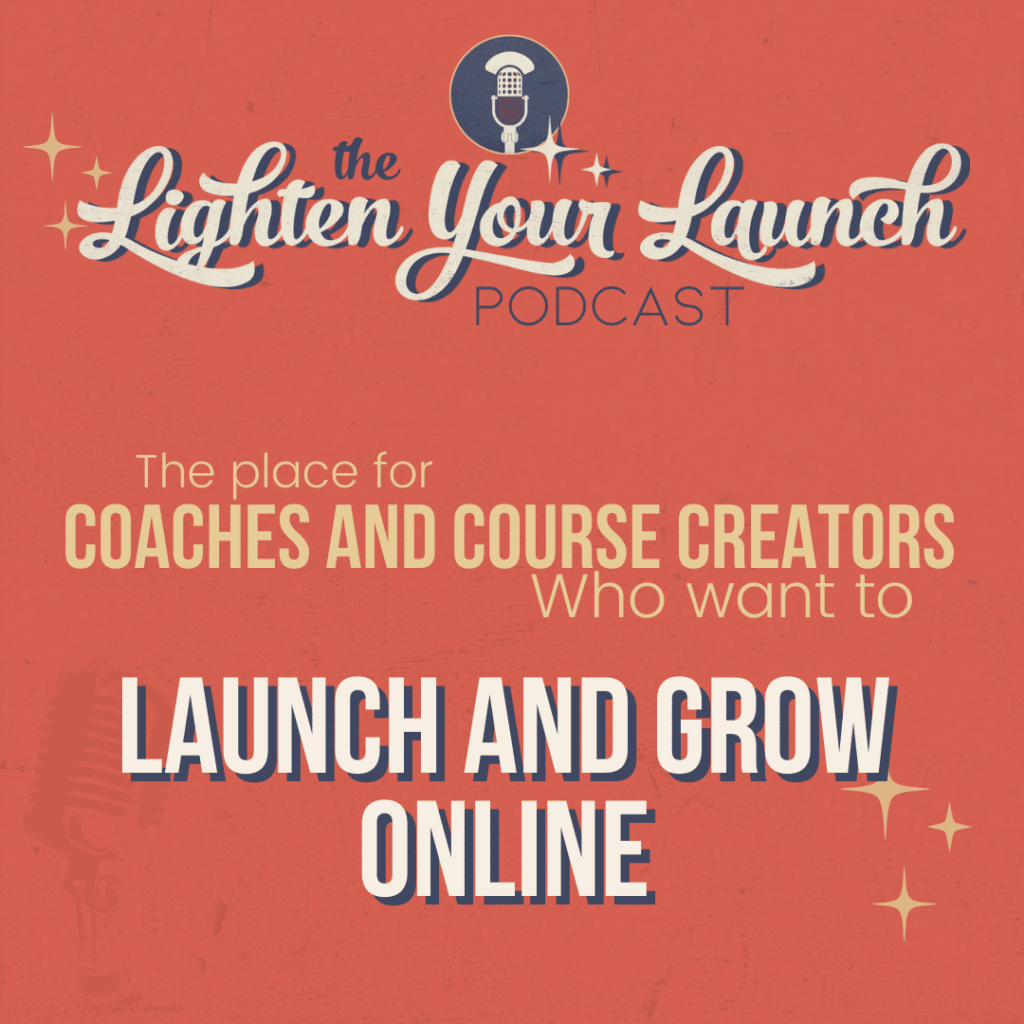
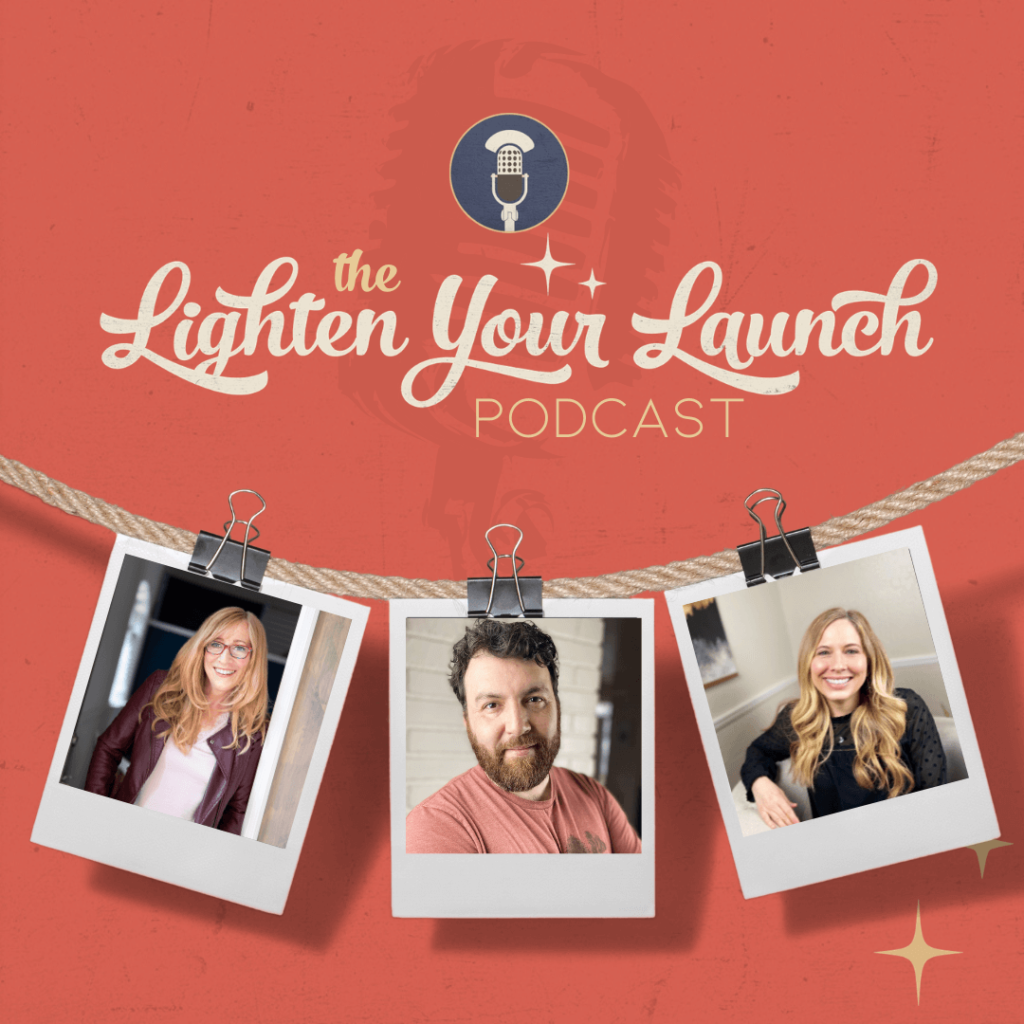


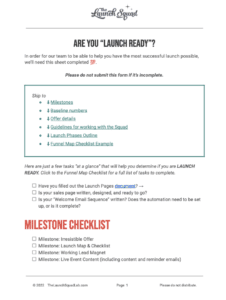
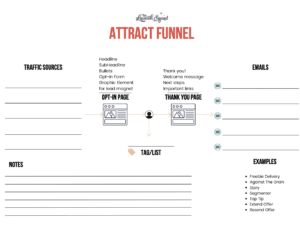
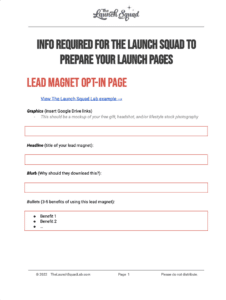
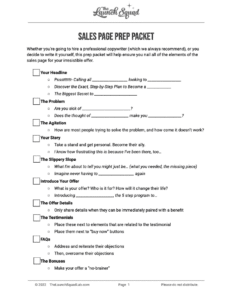
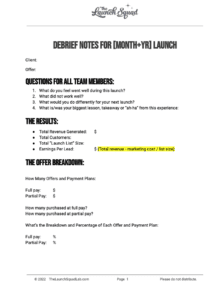
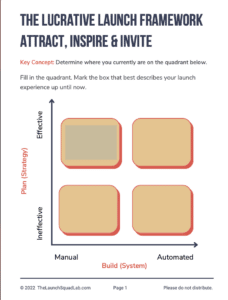
![Marketing Launch Calendar [TEMPLATE]](https://thelaunchsquadlab.com/wp-content/uploads/2023/05/Marketing-Launch-Calendar-TEMPLATE-300x260.png)
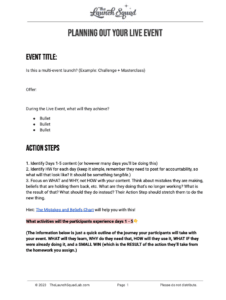
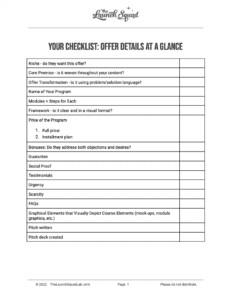
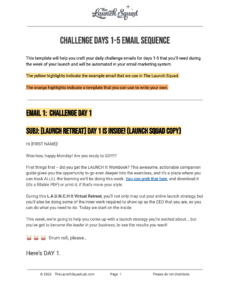
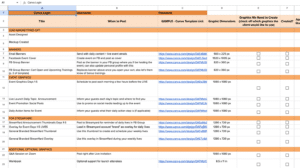
![[Updated] Email Templates for Launch](https://thelaunchsquadlab.com/wp-content/uploads/2023/05/Updated-Email-Templates-for-Launch-223x300.png)
![[REVISED] LS Pitch Script](https://thelaunchsquadlab.com/wp-content/uploads/2023/05/REVISED-LS-Pitch-Script-2023-226x300.png)

